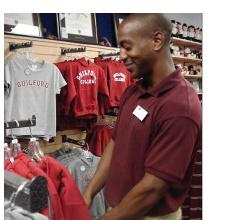Guilford’s contract with Follett expired in April of this year. It has not yet been decided whether the college will send out bids to other companies or continue with Follett.
According to Gerald Boothby, vice president for finance and administration, who is in charge of the contract, Guilford has been working with Follett since 1999, when the college outsourcing its previously independently run bookstore.
The bookstore has had two managers since switching to Follett, including Matt Walker, who was hired in fall 2004. Walker left the position this past August.
According to Boothby, until Follett hires a new manager, Shamone Washington, an intern on loan from Ivy Tech Community College, will be in charge for three weeks.
“One thing that Follett left with the campus is that I was terminated, which is false information,” said Walker.
The regional manager with Follett Higher Education group, Jim Cope, who oversees the Guilford bookstore was contacted through e-mail and phone but has not replied.
“I can’t comment names-wise but a situation did arise that caused a conflict of interest between me and Follett,” said Walker. “Because of their status as a corporate entity they feel that there was a problem, I was the manager, so automatically it’s my fault.”
According to Walker, some employees involved are still working in the bookstore.
“I took myself out of a bad situation because I couldn’t continue working with some members of the staff,” said Walker.
During the time that the “situation” was taking place, Walker was suspended for two weeks (Aug. 8-22). Follett told the Guilford community that Walker was on vacation.
“They never said why I was gone, and not even to the employees in the bookstore,” said Walker.
A few bookstore employees were contacted by the Guilfordian but declined to be interviewed.
By the time Walker left, the Guilford bookstore was one of the best-run Follett stores in the region.
“When I came to Guilford four years ago, the inventory carried in the bookstore wasn’t much, to put it mildly,” said Boothby. “Matt’s done an excellent job working with student and faculty, as well as alumni.”
When Walker arrived, the bookstore was a $700,000 account, but in the three years he has been here it has increased significantly and is now just under $2,000,000.
This year Follett changed their software for ordering and receiving textbooks, which caused several problems.
Professor of History Sarah Malino submitted her book orders to Follett by the end of June, yet all six books for both of her classes did not arrive until two weeks after classes had started.
The Follett deadline for ordering books is in April, yet professors who plan on changing the books or those who are teaching new classes are given extra time to make finalize their selections.
“My orders were in with plenty of time, and when I went to the bookstore they told me ‘I’m sure they’re here,’ but they did not have the order until they pulled up the e-mail I had sent to Walker and found the list,” said Malino.
Malino, who is also chair of the History Department, said that five out of six professors in her department had problems with getting their books on time this year.
“For two weeks my students could only do the reading because I scanned all the articles and the books online and e-mailed them to everyone,” said Malino. Now my classes are behind on the syllabus.”
Walker said that Follett should have changed the software right after graduation to allow more time for adjustment, rather than changing it in July.
Walker made key changes in how the bookstore was run, some of which were not usual Follett practice.
“I had to cheat the system so I could get the community what they wanted,” said Walker. “I took some shortcuts like ordering merchandise that the students and alumni wanted, rather than purchasing everything corporately. In the long run, Follett would have probably fired me because I was doing things differently,” said Walker.
According to Walker, Follett has about 788 stores nationwide and cannot afford to cater to each college’s needs. It is cheaper and more time efficient for them to have full control at all of their locations.
Similar corporations like Nebraska Book Company and Barnes and Noble, which Walker had worked with previously at Elon University, allow each college full control on the selection and the amount of what is purchased.
“When I got here it was clear to me that Follett did not understand the Guilford culture,” said Walker.
Walker replaced many of the school supplies sold in the store with recycled school supplies.
“Hopefully this will continue,” said Walker, “but as this is not a Follett standard, they will most likely sell through the recycled product and go back to selling non-recycled.”
Walker made other changes to the way the bookstore is run under Follett. The two major ones were increasing the staff and the hours of the store to accommodate CCE students, as well as increasing the workers’ pay.
“Before I took the job there was one full-time worker, two part-time workers, a manager, and two student workers,” said Walker, “but I had two full-time workers working with me, and 16-18 student workers, because I worked around their schedule.”
Walker paid all students workers $7-8 an hour, instead of minimum wage like they had been paid previously.
“Follett is in the process of eliminating workers, and they had already eliminated four before I left,” said Walker. “It’s a way of corporately getting rid of unnecessary expenses. The new manager will now be able to hire new workers, starting them at the bottom by paying them minimum wage and saving money. It’s a way of downsizing.”

